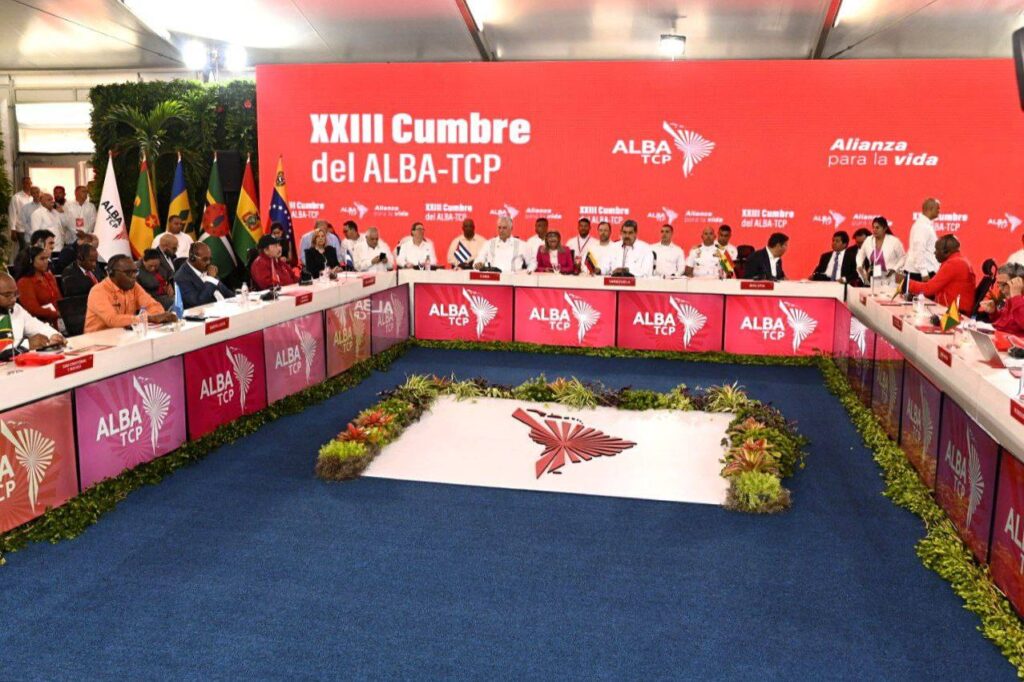Venezuelan President Nicolás Maduro has ordered the mobilisation of more than four million members of the National Bolivarian Militia, a voluntary combat unit of the Venezuelan armed forces created in 2005 by President Hugo Chávez, to defend Venezuela’s “territory, sovereignty, and peace.”
The move follows the US sending about 4,000 troops to the southern Caribbean Sea, at the edge of Venezuela’s territorial waters, in a purported anti-narcotics operation. This comes hard on the heels of Washington raising the bounty for information leading to Maduro’s arrest or conviction from $25 million to $50 million.
Support for Venezuela has come from the Bolivarian Alliance for the Peoples of Our America–Trade Treaty for the Peoples (ALBA-TCP) which last week held its 13th extraordinary summit in Caracas, addressing this latest US threat to Venezuela and to regional peace.
Countries represented at the meeting with President Nicolás Maduro, Foreign Minister Ivan Gil and senior ALBA-TCP figures were Cuba, Bolivia, Nicaragua, Saint Vincent and the Grenadines, Antigua and Barbuda, Dominica, Grenada and Saint Kitts and Nevis.
The ALBA-TCP summit, defending the designation in 2014 of Latin America and the Caribbean as a Zone of Peace and Coexistence, issued a nine-point declaration in defence of Venezuela in the face of the US’s renewed offensive of political and judicial persecution.
It denounced the US’s renewed and groundless “narco-state” narratives against Caracas as part of a strategy of judicialisation of politics seeking to delegitimise sovereign governments and pave the way for foreign intervention. Not only was this a direct attack on Venezuela’s independence, the statement argued, but also a threat to the stability and self-determination of all the peoples of Latin America and the Caribbean.
The declaration rejected the US military deployment, on the false pretext of anti-drug operations, as clearly intended to impose illegal and interfering policies, in violation of the UN Charter’s commitment to respect for sovereignty, equality of states and the self-determination of peoples.
At a recent press conference, US Secretary of State Marco Rubio had identified the deployment’s primary target to be the so-called “Cartel de los Soles,” which Washington alleges is led by Maduro and other high-ranking Venezuelan officials and is in intent on “flooding” the US with narcotics. Despite over the years never having provided any court-tested evidence of narcotics activities by the Cartel de los Soles, the alleged cartel was designated by the US on July 25 as a “foreign terrorist organization”.
To avert this risk to the peace and stability of the region, ALBA-TCP demanded the immediate cessation of any military threat or action violating the territorial integrity and political independence of the States of Latin America and the Caribbean. It further called on the US to respect the international legal framework and multilateral mechanisms for the peaceful settlement of any disputes.
ALBA-TCP also condemned the US policy of harassment and destabilisation in the region, through unilateral coercive measures, blockades, diplomatic blackmail and media campaigns, which undermined regional peace and security, citing the intensification of the US’s illegal economic, commercial and financial blockade against Cuba as causing serious harm to the well-being of the Cuban people.
In reaffirming the anti-imperialist and solidarity-based nature of ALBA-TCP, the declaration supported Columbian President Gustavo Petro’s call for an urgent meeting of the region’s foreign ministers to establish a joint position in response to threats of aggression and interference against Venezuela and any interventionist attempts to threaten peace in Latin America and the Caribbean.

